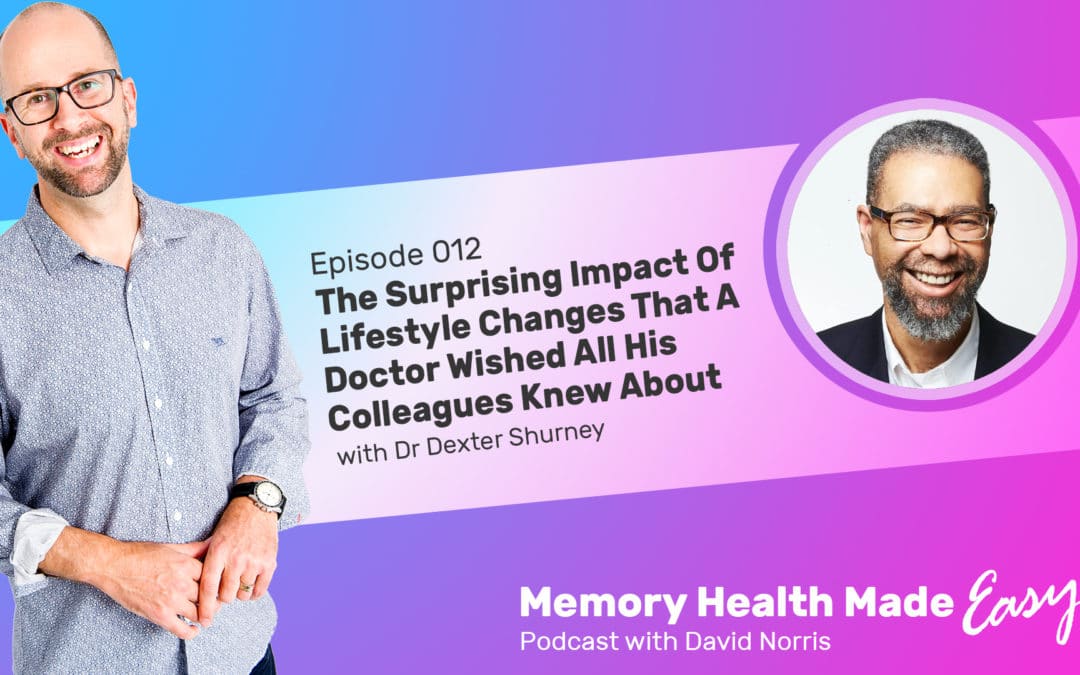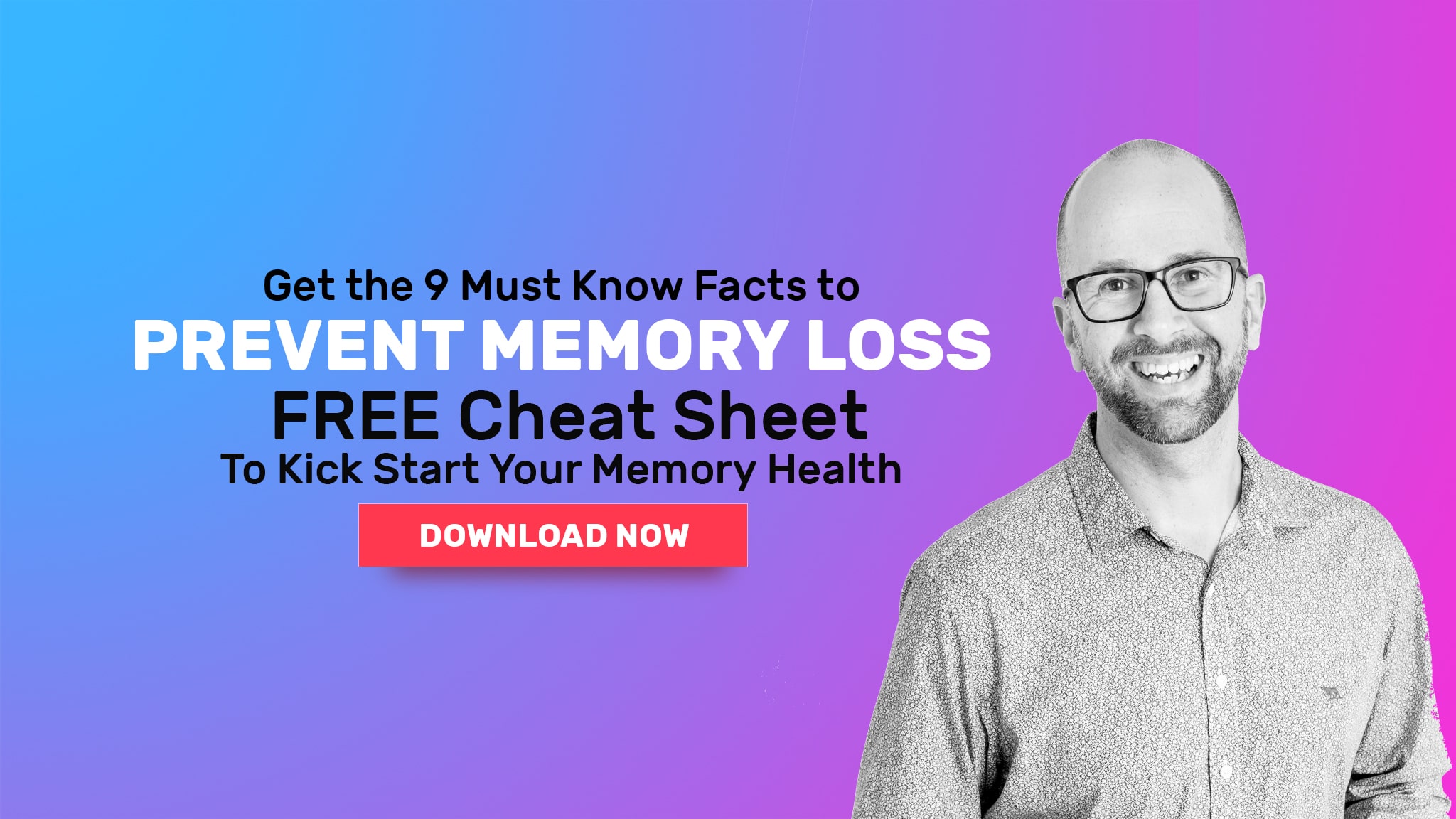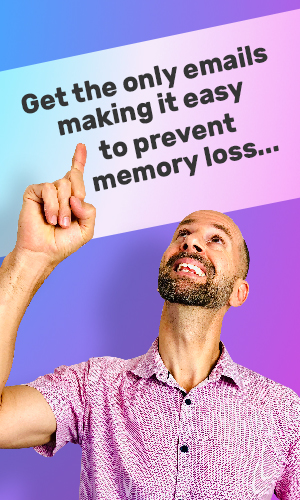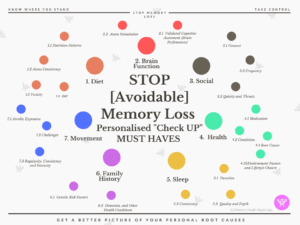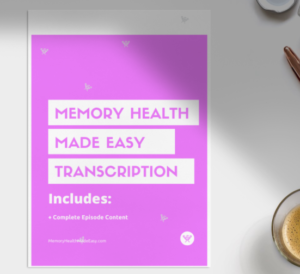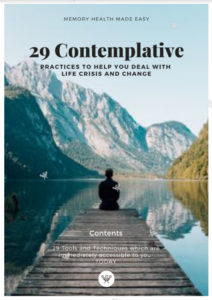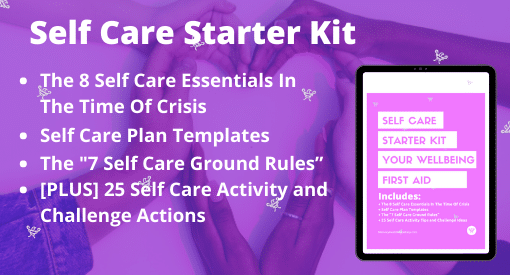iTunes | Google Play | Libsyn | Spotify | Stitcher | TuneIn Radio | YouTube | Twitter | Facebook
Bonus Material: 9 Things Your Brain Needs to Thrive Cheatsheet
How Impact of Simple Lifestyle Changes for Your Health: Movement, Sleep, and Nutrition can have Big Memory Health Rewards
When you think of medicine, the picture that often comes up involves prescription medication, surgery, and other conventional procedures.
BUT these kinds of treatments only come into play when your body and brain are already “broken”.
So conventional treatments act to fix whatever is broken.
But this only puts you in a position of having to take medication for the rest of your life.
You might find that picture grim, but that is the reality for a lot of people.
However, recent studies have shown that there is a way to strengthen your body to enable it to do what it wants, which is to heal.
This is where lifestyle medicine has stepped in and been at the forefront of this exciting opportunity.
Your health should not be determined by your genetic predisposition. You can still do something. Only you can empower your own body to do something not even medication can do.
In this show you’ll learn about:
- What is Lifestyle Medicine and why does it matter?
- Valuable lessons Dr Shurney has learned and vast data that he has collated through clinical, workplace and national campaigns
To Grow Your Brain Skills To Their Potential You Need These 9 Things In Your Life
In today’s show, you will learn the power of simple daily actions and how they can have a huge impact and health benefit.
Listen To The Podcast Now.
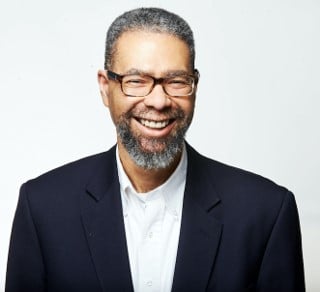
About Our Guest
Dr Dexter Shurney, MD, MBA, MPH, FACLM is President of the American College of Lifestyle Medicine and Editor of the Journal of Managed Care Physicians. He is also Chief Medical Officer and Senior Vice President of Clinical Affairs for Zipongo, a San Francisco-based digital health and wellness company. Dr. Shurney serves on numerous boards including: the Global Business Group on Health and the National Association of Managed Care Physicians. Dr Shurney is co-author of the book, “Integrating Wellness into Your Disease Management Programs.”
Why Lifestyle Medicine
The Trajectory That Led Him To Lifestyle Medicine
- Dr Shurney talks about shifting in specialty from general surgery to preventive medicine.
- He remembers hearing about lifestyle medicine while devising plans and protocols for chronic disease management.
- He shares how he got interested and applied lifestyle medicine to himself to treat diabetes and hypertension.
- He recounts facing rejection from family members who are also medical professionals when he told them about his experience.
What Is Lifestyle Medicine: Making Changes for Better Health
- Lifestyle medicine is a holistic approach to allowing your body to do what it wants to do, which is to become whole and well.
- Your body wants nutritious food and exercise.
- Doing the basics and fundamentals to strengthen your body to heal itself can cure 60-70% of chronic diseases.
- If you dial it up, you can even reverse chronic disease.
Lifestyle Is Often Neglected
- Most people don’t know what it means to live a healthy life.
- People with a high genetic risk factor for developing dementia can reduce their lifetime risk by 30% through healthy lifestyle decisions.
- There is no medication in the market that can have the same impact.
- Two observation studies, one involving identical twins and another involving Japanese people living in the States versus those living in Japan, supported how lifestyle can be impactful in a powerful way.
Simple Lifestyle Changes For Your Health: Actions That Have Huge Health Impacts
- Adding bits of physical activity or healthy food choices can result in non-exercise activity thermogenesis (NEAT).
- There are many ways to include physical activity in the office environment to avoid being sedentary.
- Add more potassium to your diet to counteract too much sodium.
- Stop cooking with salt and instead put salt on the table to season the food when you’re eating.
- Having a community of people around lifestyle medicine can empower people to make those healthy lifestyle choices.
- We live in a culture that pushes us in the wrong direction.
- Culture and environment drive the health and longevity of people.
- Integration and connection in all facets of our life, and creating a community that nurtures this are key.
- People living in Blue Zones have shown to benefit from health and longevity.
Working At Zipongo
- The use of a digital platform allows them to reach millions of people around the world.
- Their goal is to provide food that is convenient, affordable, and looks good.
- Their Food Smart program suggests food based on your allergies, preferences, and the gaps in your nutrition determined by their NutriQuiz. Discounts are also available.
- Ordering from their platform removes the temptation of buying unhealthy food.
New Frontiers In Lifestyle Medicine
- More and more physicians are becoming interested in lifestyle medicine.
- Research on gut microbiome shows lifestyle medicine has an impact on it.
- Gut microbiome also plays a role in how our brain functions.
- The bacteria in our stomach can affect our mood.
- Work around irritable bowel syndrome shows that it has a link to mental health.
Other Podcast Episodes
Here are the links to the other episodes mentioned in today’s podcast:
- Ep 005: Food, Mood, Microbiome and Your Memory with Dr Amy Loughman
- Ep 008: How Your Gut Health Affects Your Brain and Memory Health with Scott C Anderson
- Ep 007: How To Heal My Brain After A Stroke with Bill Gasiamis
By taking simple lifestyle actions, people with a high genetic risk for dementia can reduce their risk by 32% Click To Tweet
Previously Recommended Resources
Articles:
- Kicking Back Cognitive Ageing: Leg Power Predicts Cognitive Ageing after Ten Years in Older Female Twins
- Steves, C. J., Mehta, M. M., Jackson, S. H., & Spector, T. D. (2016).. Gerontology, 62(2), 138–149. doi:10.1159/000441029 https://www.ncbi.nlm.nih.gov/pmc/articles/PMC4789972/
- TwinsU.K: The longitudinal ageing research includes normal brain ageing, investigating the genetic and environmental determinants of cognitive decline, and age-related cardiovascular changes such as hypertension https://twinsuk.ac.uk/
- Blue Zones: Informed and inspired by the world’s longest-lived cultures, Blues Zones help people live longer, better lives by improving their environment. https://www.bluezones.com/
- Some associations of vegetarian diets with lower cardiovascular mortality and lower noncardiovascular, non-cancer mortality were observed. Vegetarian diets have been associated with more favourable levels of cardiovascular risk factors.
- Vegetarian Dietary Patterns and Mortality in Adventist Health Study 2
- Orlich MJ, Singh PN, Sabaté J, et al. JAMA Intern Med. 2013;173(13):1230–1238.doi:10.1001/jamainternmed.2013.6473 https://www.ncbi.nlm.nih.gov/pmc/articles/PMC4191896/#!po=71.0526
- Adherence to a healthy lifestyle at mid-life is associated with a longer life expectancy free of major chronic diseases
- Li Yanping, Schoufour Josje, Wang Dong D, Dhana Klodian, Pan An, Liu Xiaoran et al. Healthy lifestyle and life expectancy free of cancer, cardiovascular disease, and type 2 diabetes: prospective cohort study BMJ 2020; 368 :l6669 https://www.bmj.com/content/368/bmj.l6669
- In the context of inherited (genetic) dementia risks it is possible to reduce your personal risk for dementia via your own personal actions: People at high risk of dementia who adopt healthy habits could be 32% less likely to contract the disease than those with an unhealthy lifestyle.
- The major international study, which involved researchers from the University of South Australia, analysed data from 196,383 adults and identified 1769 cases of dementia over a follow-up period of eight years.
- Association of Lifestyle and Genetic Risk With Incidence of Dementia
- Lourida I, Hannon E, Littlejohns TJ, et al. JAMA. 2019;322(5):430–437. doi:10.1001/jama.2019.9879 https://jamanetwork.com/journals/jama/fullarticle/2738355
- NEAT: Non-exercise activity thermogenesis (NEAT)
- Non-exercise activity thermogenesis (NEAT) is the energy expended for everything we do that is not sleeping, eating or sports-like exercise. It ranges from the energy expended walking to work, typing, performing yard work, undertaking agricultural tasks and fidgeting. https://www.ncbi.nlm.nih.gov/pubmed/12468415
- Lifestyle Medicine Evidence:
- The evidence behind lifestyle medicine. By no means a total compilation of evidence it is a cherry picked handful of some the evidence supporting Lifestyle Medicine https://www.lifestylemedicine.org/ACLM/Lifestyle_Medicine/Scientific_Evidence/ACLM/About/What_is_Lifestyle_Medicine_/Scientific_Evidence.aspx?hkey=ed4b4130-6ce9-41bb-8703-
You can reach out to Dr Shurney on his LinkedIn or at the American College of Lifestyle Medicine. Visit Zipongo to learn more about their food programs.
Enjoy The Podcast?
If it’s a “Oh Yes I did David!” Then please, do yourself a huge favour and subscribe to the podcast.
5 Star Review Worthy? If it is we’d love your review. It really does go a long way to help us reach and serve more people.
Do you want to help other people prevent avoidable memory loss? Yes? One simple way is to share what you’ve learned today.
Here’s How: Take a screenshot of the podcast, post it on social media, make a comment and link to the show, is one, very easy way to help cement your learning and brings you closer to action as well as gifting to others the seeds of better memory health!
FREE Guide To Help Prevent Memory Loss
Grab a free copy of the 9 Principles for Memory Health For Life CLICK HERE. A simple framework to reduce your risk for memory loss. Go on, what have you got to lose?
We have a lot of resources and resources to help you stop avoidable memory loss. If you’re interested to learn more about our services and programs, just go to the website.
Of course you can reach me, David Norris, here on the website and connect with me on LinkedIn or Twitter.
To better memory health,
David
P.S. Did you get the free guide? If not, here’s the link.
Disclaimer: The purpose of Memory Health Made Easy Podcast is to educate and to inform. It is no substitute for professional care by a doctor or qualified professional. This podcast is provided on understanding that it does not constitute medical or personal professional advice or services. Instead, we would encourage you to discuss your options with a health care provider who specialises in your particular needs.

